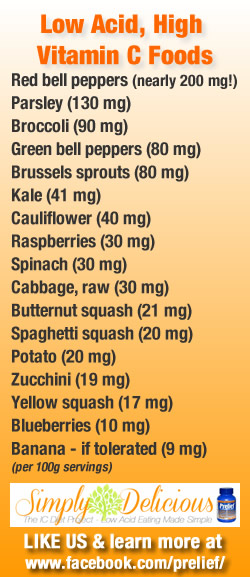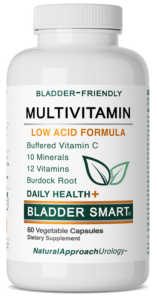All too often when IC patients hear about food that is high in vitamin C, we go running far away from it in fear of it irritating our bladders. I’ve had dreams of eating citrus fruit and even in my sleep, I was scared of how much it was going to make me hurt. I’ve avoided orange juice like the plague. Even citrus scented cleaning products have inspired cravings for an ice cold lemonade that I won’t dare touch. However, the human body needs vitamin C; it is beneficial in numerous ways. Fortunately, there are some IC friendly ways to get the vitamin if we just think beyond citrus fruit.
Researchers and patients alike have known that citrus can irritate IC bladders for years. And vitamin C itself (also known as ascorbic acid) is acidic. Combining the acidic properties of vitamin C with very acidic citrus fruits that contain high levels of the vitamin, makes for a perfect storm of hurt for IC bladders. Putting something acidic on a wound or open sore is only going to cause more pain and discomfort, which is exactly why it also irritates IC bladders.
Why vitamin C is important
Writing off vitamin C as not worth the effort is tempting, but the vitamin really does help our bodies in numerous ways. According to the University of Maryland Medical Center, vitamin C is responsible for growing and repairing tissues throughout the body. It helps the body make collagen, which is what makes skin, cartilage, tendons, ligaments and blood vessels. Though the acid in vitamin C hurts when applied to an open wound, the vitamin itself is needed to help heal wounds as well as keeping bones and teeth healthy.
And that’s only the tip of the iceberg. Vitamin C helps protect against things like heart disease, high blood pressure, the common cold, cancer, osteoarthritis, asthma and more. It can also be helpful for increasing immunity, lowering blood sugar in diabetics and on and on the list goes.
Not having enough vitamin C can also cause problems. And it can be a challenge, because the body doesn’t store vitamin C, so it needs to be a regular part of a healthy diet. Otherwise, a vitamin C deficiency can develop and cause things like dry and splitting hair, gum inflammation, dry skin, easy bruising and nosebleeds. Being deficient can slow your body’s wound healing and decrease its ability to fight infections. The most severe form of vitamin C deficiency is scurvy.
 How to get more vitamin C
How to get more vitamin C
A couple of options exist for getting adequate amounts of vitamin C. First, you can eat foods containing vitamin C. Second, you can take a supplement. Doing both can work as well. The good news about vitamin C is you can’t overdose on it, because the body flushes it out. The bad news about that for IC patients is that means a potential for increased frequency, so the goal is to get the right amount of vitamin C and not too much. The recommended daily allowance for adults over age 18 is 90 mg a day for men and 75 mg per day for women. Smoking can deplete vitamin C, so smokers may need an additional 35 mg of vitamin C a day.
When it comes to foods high in vitamin C, most people tend to go right to oranges and orange juice. But, in fact, oranges are the sixth highest food with vitamin C. The food with the most vitamin C is guava with about 206 mg per serving. However, guava is a high-risk food for causing IC symptoms.
The second highest food with vitamin C, though, is usually bladder friendly. A serving of raw yellow or red bell peppers come in with a whopping 101 to 144 mg of vitamin C per half cup. Cook those same veggies and get 121 to 132 mg of vitamin C per half cup. While the number four and five foods high in vitamin C, papaya and kiwi, aren’t quite as bladder friendly, there are still quite a few other options for IC patients.
Trying in small doses first, of course, are fruits like honeydew melons (31 mg vitamin C per cup), bananas (13 mg vitamin C per cup), blueberries (14 mg vitamin C per cup), watermelon (12 mg vitamin C per cup) and mango (60 mg vitamin C per cup). Veggies also make the list with raw green bell peppers (126 mg vitamin C per cup), cooked broccoli (108 mg vitamin C per cup), raw broccoli (84 mg of vitamin C per cup), cooked potatoes with skin (14-31 mg vitamin C per medium-sized potato) and cooked sweet potato with skin (22 mg of vitamin C per medium-sized potato).
Supplement Options
 Food options for vitamin C exist for ICers, but they may not be enough. Taking a vitamin C supplement can be helpful. But, again because the vitamin itself is acidic, finding the right supplement for IC patients is important.
Food options for vitamin C exist for ICers, but they may not be enough. Taking a vitamin C supplement can be helpful. But, again because the vitamin itself is acidic, finding the right supplement for IC patients is important.
The two main sources of vitamin C are ascorbic acid) and calcium ascorbate. Calcium ascorbate is commercially prepared in a laboratory while ascorbic acid occurs naturally. Biologically the two are the same, but calcium ascorbate is less acidic. In fact, a study way back in 2006 found that people sensitive to acidic foods responded much better to calcium ascorbate than ascorbic acid. The study concluded that calcium ascorbate seems to have fewer adverse side effects for patients who are sensitive to acidic foods.
The ICN has two products which provide low acid Vitamin C support. The Bladder Smart® Low Acid Multivitamin contains calcium ascorbate to minimize bladder irritation with the added benefit of calcium glycerophosphate to reduce the overall acid impact of the vitamin. It is now very popular among IC patients. We also sell EsterC (calcium ascorbate) separately.
Conclusion
Vitamin C is perhaps best described as a frenemy to IC patients. We need the vitamin and its benefits for healthy living, but we must be careful with how we ingest it whether in food or supplement form or both.
Updated: 11/13/23 – JHO
Created: 2/17/2018 – StaceyS

